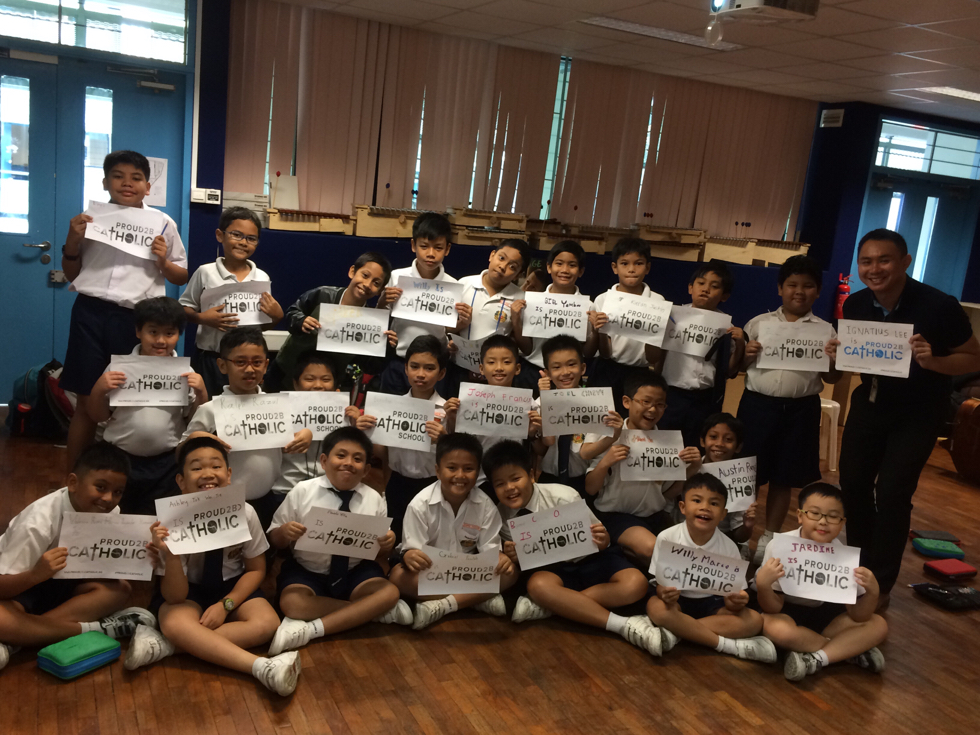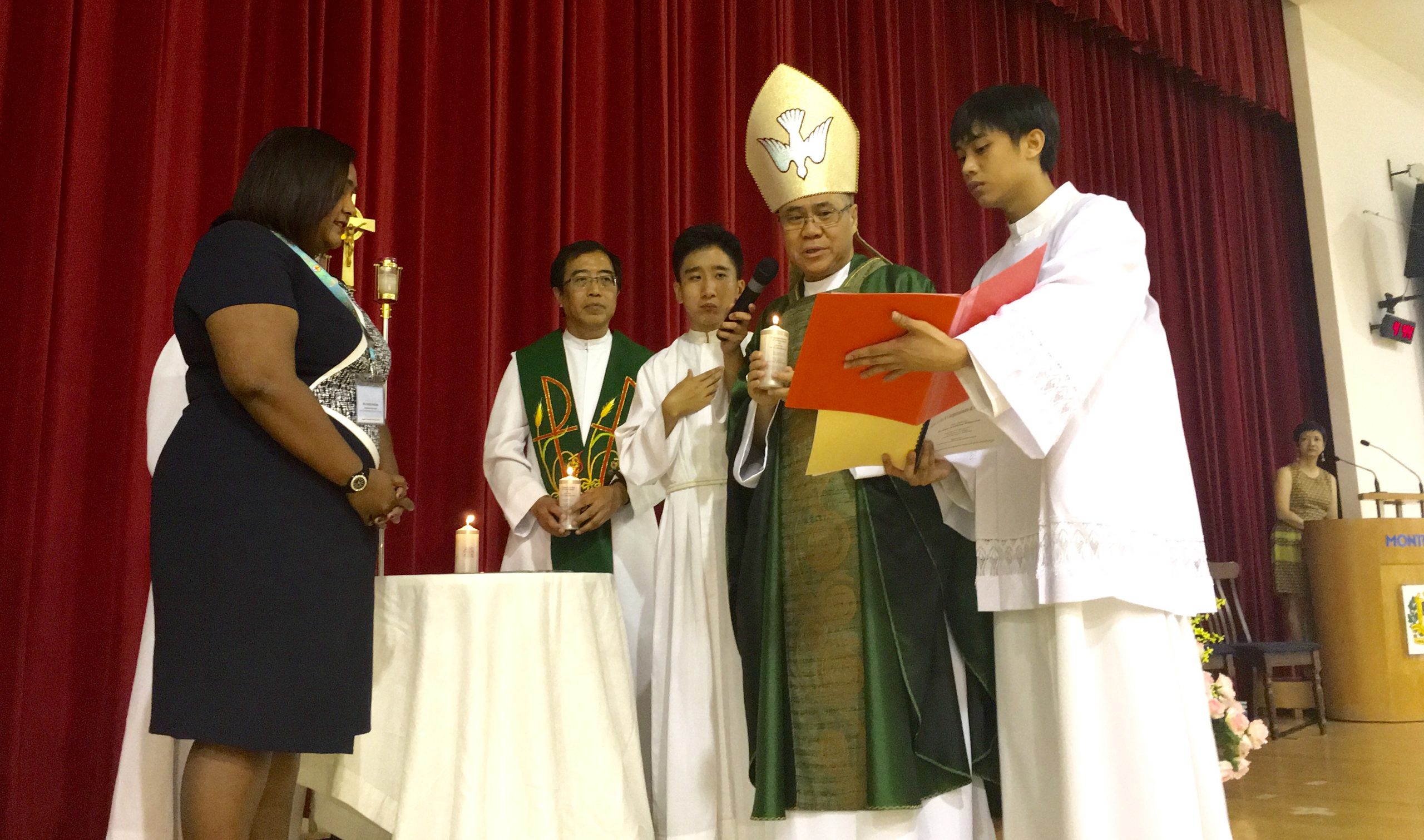Ignatius Lee has been a teacher for over five years, and handles English, Maths, Science, Social Studies and Religious Education at Montfort Junior School.
Why did you want to be a teacher?
My late father was a teacher. I was also influenced when I joined a mission group, Acts29, back in 2004. The works of a lady, Tita Leticia Reyes, who set up the Paaralang Pantao, a free school for underprivileged children in the Payatas dump site in Manila, as well as my friend, Sherlyn Khong, the founder of acts29, inspired me to desire to make a difference in the lives of children.
What would you say is the biggest challenge you face as a Catholic educator?
Having to juggle the many demands expected as an educator by MOE and trying to live out the faith as a Catholic in school can be challenging. As a Religious Education coordinator, the demands are great and I try to live out the values as best as I can.
How do you overcome these challenges?
I am thankful to have supportive colleagues and friends who offer suggestions or lend me a listening ear. Parent volunteers have been also very supportive and they have contributed much. Prayer is also essential and I try to spend some quiet time reading scriptures where possible.
If you weren’t a teacher today, how different would your life have been?
Perhaps I might be working as an accountant, since I did accounting back in Temasek Polytechnic. This changed when I became more involved in a mission group called Acts29, which is involved in mission work in the Philippines. At that time, acts29 was involved with the work of Paaralang Pantao at the Payatas dumpsite. This was a school set up by Leticia Reyes, Filipino lady who dedicated her life to providing informal education for children whose parents couldn’t afford proper schooling. During my encounters with the children, I was very touched by their simplicity and joy in their daily living. They were so happy even though they didn’t have much. Some barely had food to eat except during the feeding programme in the school. However, they were so hungry to study and learn. This changed my perception that perhaps, I should do something in my life to try and make a difference in the lives of children, just as they did for me. So I became a teacher, hoping to make at least some difference in the lives of children.
What is your fondest memory/experience as a teacher?
On teachers’ day, especially when my pupils write special notes of thank you. I even received a superhero comic strip last year which was really cute.
What do you like most about being a Catholic?
When I am challenged constantly in my faith, there is always the Eucharist to turn to. Mother Mary has also been my constant intercessor.
What do you like most about being a teacher?
To try and educate and impart values is most rewarding. Hopefully, I have set enough good examples.
Has your faith affected you in your role as a teacher in any way?
Since I am involved in Religious Education, I also have to read up on the Catechism of the Catholic Church and to turn to bible scriptures more often. Also, I get to pray every day and that is a constant reminder to prepare for the day ahead, which is challenging at times.
What are some of your key priorities as a teacher?
While teaching the subject knowledge and content is important, the need to spend time with each pupil can be challenging. There are many pupils who are desperately seeking attention and sometimes they do it the worst way possible—by disrupting the lessons. When I get the chance to, I try to talk to them or speak about the Christian values the school promotes; Compassion, Humility, Respect, Integrity, Service, Team Spirit, and Excellence.
What is one way you try to inspire your students?
Perhaps to encourage them not to give up when they don’t perform well in their studies. Small rewards can also be beneficial to boost their morale.
Do you try to share your faith with students? How so?
Teaching Religious Education is one way I do so. Sometimes, when I do speak on stage during sharings every Monday, I will try bringing in bible stories to relate to the everyday lives of students.
How do you keep close to God?
I do struggle to pray consistently during the week, especially during days when there is a lot of marking or other administrative work, which can pile up during the term. I was lucky to be put in charge of my school’s Catholic students society a few years ago. In a way, it forced me to re-examine my own spiritual growth because I had to start inculcating Catholic ethos into these pupils by teaching Religious Education. With my lack of experience as a parish catechist, I had to read other spiritual growth books and attend ACCS or other related faith formation courses so I could be more in tune with my spiritual growth. I try to read the Gospels daily, to help me be quiet for a moment and offer my challenges to God.
What brings you joy in life?
If I can make a difference, even in small ways. I was pleasantly surprised to see that three of my pupils recently joined the altar servers at Nativity church. It was great to see them continue their own faith journeys. Two of my non-Catholic pupils are also willing to serve during the school’s Friday Mass, so I’m happy to see them willing to contribute too.
What is your favourite scripture passage?
My favourite bible verse is Matthew 11:28-29, “Come to me all you that are weary and are carrying heavy burdens, and I will give you rest. Take my yoke upon you, and learn from me; for I am gentle and humble in heart, and you will find rest for your souls.”
I always find the strength to carry on when I’m tired and weary through this verse. It also helps me realise that I can’t always depend on myself, I need to let go and let God take charge.



